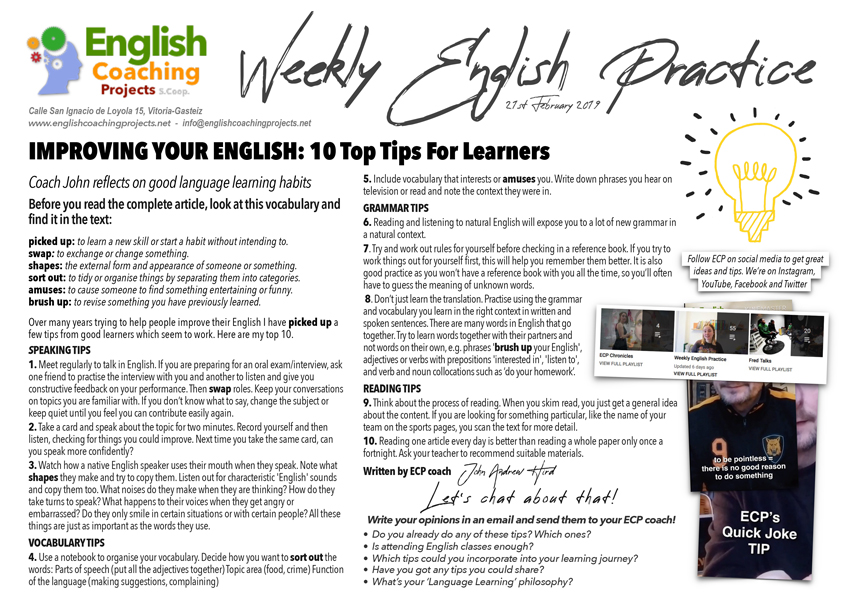ECP coach John talks about how he has learned about learning from his learners. This week’s Weekly English Practice contains his 10 Top Tips!
Click on the image to download the pdf
Coach John reflects on good language learning habits
Before you read the complete article, look at this vocabulary and find it in the text:
picked up: to learn a new skill or start a habit without intending to.
swap: to exchange or change something.
shapes: the external form and appearance of someone or something.
sort out: to tidy or organise things by separating them into categories.
amuses: to cause someone to find something entertaining or funny.
brush up: to revise something you have previously learned.
Listen to the audio (refresh the page if it’s not visible)
Over many years trying to help people improve their English I have picked up a few tips from good learners which seem to work. Here are my top 10.
SPEAKING TIPS
1. Meet regularly to talk in English. If you are preparing for an oral exam/interview, ask one friend to practise the interview with you and another to listen and give you constructive feedback on your performance. Then swap roles. Keep your conversations on topics you are familiar with. If you don’t know what to say, change the subject or keep quiet until you feel you can contribute easily again.
2. Take a card and speak about the topic for two minutes. Record yourself and then listen, checking for things you could improve. Next time you take the same card, can you speak more confidently?
3. Watch how a native English speaker uses their mouth when they speak. Note what shapes they make and try to copy them. Listen out for characteristic ‘English’ sounds and copy them too. What noises do they make when they are thinking? How do they take turns to speak? What happens to their voices when they get angry or embarrassed? Do they only smile in certain situations or with certain people? All these things are just as important as the words they use.
VOCABULARY TIPS
4. Use a notebook to organise your vocabulary. Decide how you want to sort out the words: Parts of speech (put all the adjectives together) Topic area (food, crime) Function of the language (making suggestions, complaining)
5. Include vocabulary that interests or amuses you. Write down phrases you hear on television or read and note the context they were in.
GRAMMAR TIPS
6. Reading and listening to natural English will expose you to a lot of new grammar in a natural context.
7. Try and work out rules for yourself before checking in a reference book. If you try to work things out for yourself first, this will help you remember them better. It is also good practice as you won’t have a reference book with you all the time, so you’ll often have to guess the meaning of unknown words.
8. Don’t just learn the translation. Practise using the grammar and vocabulary you learn in the right context in written and spoken sentences. There are many words in English that go together. Try to learn words together with their partners and not words on their own, e.g. phrases ‘brush up your English’, adjectives or verbs with prepositions ‘interested in’, ‘listen to’, and verb and noun collocations such as ‘do your homework’.
READING TIPS
9. Think about the process of reading. When you skim read, you just get a general idea about the content. If you are looking for something particular, like the name of your team on the sports pages, you scan the text for more detail.
10. Reading one article every day is better than reading a whole paper only once a fortnight. Ask your teacher to recommend suitable materials.
Written by ECP coach John Andrew Hird
Let’s chat about that!
Write your opinions in an email and send them to your ECP coach!
- Do you already do any of these tips? Which ones?
- Is attending English classes enough?
- Which tips could you incorporate into your learning journey?
- Have you got any tips you could share?
- What’s your ‘Language Learning’ philosophy?


